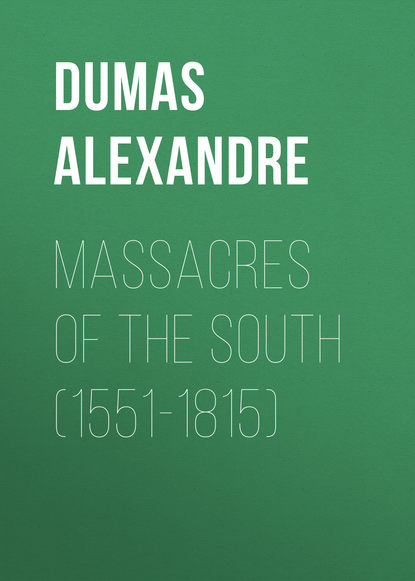По всем вопросам обращайтесь на: info@litportal.ru
(©) 2003-2024.
✖
Massacres of the South (1551-1815)
Настройки чтения
Размер шрифта
Высота строк
Поля
Unfortunately for the Catholic party, Dupre and Lieutaud, to whom this letter was entrusted for delivery, and for whom passports were made out as being employed on business connected with the king and the State, were arrested at Vehaud, and their despatches laid before the Electoral Assembly. Many other letters of the same kind were also intercepted, and the red-tufts went about the town saying that the Catholics of Nimes were being massacred.
The priest of Courbessac, among others, was shown a letter saying that a Capuchin monk had been murdered, and that the Catholics were in need of help. The agents who brought this letter to him wanted him to put his name to it that they might show it everywhere, but were met by a positive refusal.
At Bouillargues and Manduel the tocsin was sounded: the two villages joined forces, and with weapons in their hands marched along the road from Beaucaire to Nimes. At the bridge of Quart the villagers of Redressan and Marguerite joined them. Thus reinforced, they were able to bar the way to all who passed and subject them to examination; if a man could show he was a Catholic, he was allowed to proceed, but the Protestants were murdered then and there. We may remind our readers that the “Cadets de la Croix” pursued the same method in 1704.
Meantime Descombiez, Froment, and Folacher remained masters of the ramparts and the tower, and when very early one morning their forces were augmented by the insurgents from the villages (about two hundred men), they took advantage of their strength to force a way into the house of a certain Therond, from which it was easy to effect an entrance to the Jacobin monastery, and from there to the tower adjoining, so that their line now extended from the gate at the bridge of Calquieres to that at the end of College Street. From daylight to dusk all the patriots who came within range were fired at whether they were armed or not.
On the 14th June, at four o’clock in the morning, that part of the legion which was against the Catholics gathered together in the square of the Esplanade, where they were joined by the patriots from the adjacent towns and villages, who came in in small parties till they formed quite an army. At five A.M. M. de St. Pons, knowing that the windows of the Capuchin monastery commanded the position taken up by the patriots, went there with a company and searched the house thoroughly, and also the Amphitheatre, but found nothing suspicious in either.
Immediately after, news was heard of the massacres that had taken place during the night.
The country-house belonging to M. and Mme. Noguies had been broken into, the furniture destroyed, the owners killed in their beds, and an old man of seventy who lived with them cut to pieces with a scythe.
A young fellow of fifteen, named Payre, in passing near the guard placed at the Pont des files, had been asked by a red-tuft if he were Catholic or Protestant. On his replying he was Protestant, he was shot dead on the spot. “That was like killing a lamb,” said a comrade to the murderer. “Pooh!” said he, “I have taken a vow to kill four Protestants, and he may pass for one.”
M Maigre, an old man of eighty-two, head of one of the most respected families in the neighbourhood, tried to escape from his house along with his son, his daughter-in-law, two grandchildren, and two servants; but the carriage was stopped, and while the rebels were murdering him and his son, the mother and her two children succeeded in escaping to an inn, whither the assassins pursued them, Fortunately, however, the two fugitives having a start, reached the inn a few minutes before their pursuers, and the innkeeper had enough presence of mind to conceal them and open the garden gate by which he said they had escaped. The Catholics, believing him, scattered over the country to look for them, and during their absence the mother and children were rescued by the mounted patrol.
The exasperation of the Protestants rose higher and higher as reports of these murders came in one by one, till at last the desire for vengeance could no longer be repressed, and they were clamorously insisting on being led against the ramparts and the towers, when without warning a heavy fusillade began from the windows and the clock tower of the Capuchin monastery. M. Massin, a municipal officer, was killed on the spot, a sapper fatally wounded, and twenty-five of the National Guard wounded more or less severely. The Protestants immediately rushed towards the monastery in a disorderly mass; but the superior, instead of ordering the gates to be opened, appeared at a window above the entrance, and addressing the assailants as the vilest of the vile, asked them what they wanted at the monastery. “We want to destroy it, we want to pull it down till not one stone rests upon another,” they replied. Upon this, the reverend father ordered the alarm bells to be rung, and from the mouths of bronze issued the call for help; but before it could arrive, the door was burst in with hatchets, and five Capuchins and several of the militia who wore the red tuft were killed, while all the other occupants of the monastery ran away, taking refuge in the house of a Protestant called Paulhan. During this attack the church was respected; a man from Sornmieres, however, stole a pyx which he found in the sacristy, but as soon as his comrades perceived this he was arrested and sent to prison.
In the monastery itself, however, the doors were broken in, the furniture smashed, the library and the dispensary wrecked. The sacristy itself was not spared, its presses being broken into, its chests destroyed, and two monstrances broken; but nothing further was touched. The storehouses and the small cloth-factory connected with the monastery remained intact, like the church.
But still the towers held out, and it was round them that the real fighting took place, the resistance offered from within being all the more obstinate that the besieged expected relief from moment to moment, not knowing that their letters had been intercepted by the enemy. On every side the rattling of shot was heard, from the Esplanade, from the windows, from the roofs; but very little effect was produced by the Protestants, for Descombiez had told his men to put their caps with the red tufts on the top of the wall, to attract the bullets, while they fired from the side. Meantime the conspirators, in order to get a better command of the besiegers, reopened a passage which had been long walled up between the tower Du Poids and the tower of the Dominicans. Descombiez, accompanied by thirty men, came to the door of the monastery nearest the fortifications and demanded the key of another door which led to that part of the ramparts which was opposite the place des Carmes, where the National Guards were stationed. In spite of the remonstrances of the monks, who saw that it would expose them to great danger, the doors were opened, and Froment hastened to occupy every post of vantage, and the battle began in that quarter, too, becoming fiercer as the conspirators remarked that every minute brought the Protestants reinforcements from Gardonninque and La Vaunage. The firing began at ten o’clock in the morning, and at four o’clock in the afternoon it was going on with unabated fury.
At four o’clock, however, a servant carrying a flag of truce appeared; he brought a letter from Descombiez, Fremont, and Folacher, who styled themselves “Captains commanding the towers of the Castle.” It was couched in the following words: —
“To the Commandant of the troops of the line, with the request that the contents be communicated to the militia stationed in the Esplanade.
“SIR, – We have just been informed that you are anxious for peace. We also desire it, and have never done anything to break it. If those who have caused the frightful confusion which at present prevails in the city are willing to bring it to an end, we offer to forget the past and to live with them as brothers.
“We remain, with all the frankness and loyalty of patriots and Frenchmen, your humble servants,
“The Captains of the Legion of Nimes, in command of the towers of the Castle,
“FROMENT, DESCOMBIEZ, FOLACHER NIMES, the 14th June 1790, 4.00 P.M.”
On the receipt of this letter, the city herald was sent to the towers to offer the rebels terms of capitulation. The three “captains in command” came out to discuss the terms with the commissioners of the electoral body; they were armed and followed by a great number of adherents. However, as the negotiators desired peace before all things, they proposed that the three chiefs should surrender and place themselves in the hands of the Electoral Assembly. This offer being refused, the electoral commissioners withdrew, and the rebels retired behind their fortifications. About five o’clock in the evening, just as the negotiations were broken off, M. Aubry, an artillery captain who had been sent with two hundred men to the depot of field artillery in the country, returned with six pieces of ordnance, determined to make a breach in the tower occupied by the conspirators, and from which they were firing in safety at the soldiers, who had no cover. At six o’clock, the guns being mounted, their thunder began, first drowning the noise of the musketry and then silencing it altogether; for the cannon balls did their work quickly, and before long the tower threatened to fall. Thereupon the electoral commissioners ordered the firing to cease for a moment, in the hope that now the danger had become so imminent the leaders would accept the conditions which they had refused one hour before; and not desiring to drive them to desperation, the commissioners advanced again down College Street, preceded by a bugler, and the captains were once more summoned to a parley. Froment and Descombiez came out to meet them, and seeing the condition of the tower, they agreed to lay down their arms and send them for the palace, while they themselves would proceed to the Electoral Assembly and place themselves under its protection. These proposals being accepted, the commissioners waved their hats as a sign that the treaty was concluded.
At that instant three shots were fired from the ramparts, and cries of “Treachery! treachery!” were heard on every side. The Catholic chiefs returned to the tower, while the Protestants, believing that the commissioners were being assassinated, reopened the cannonade; but finding that it took too long to complete the breach, ladders were brought, the walls scaled, and the towers carried by assault. Some of the Catholics were killed, the others gained Froment’s house, where, encouraged by him, they tried to organise a resistance; but the assailants, despite the oncoming darkness, attacked the place with such fury that doors and windows were shattered in an instant. Froment and his brother Pierre tried to escape by a narrow staircase which led to the roof, but before they reached it Pierre was wounded in the hip and fell; but Froment reached the roof, and sprang upon an adjacent housetop, and climbing from roof to roof, reached the college, and getting into it by a garret window, took refuge in a large room which was always unoccupied at night, being used during the day as a study.
Froment remained hidden there until eleven o’clock. It being then completely dark, he got out of the window, crossed the city, gained the open country, and walking all night, concealed himself during the day in the house of a Catholic. The next night he set off again, and reached the coast, where he embarked on board a vessel for Italy, in order to report to those who had sent him the disastrous result of his enterprise.
For three whole days the carnage lasted. The Protestants losing all control over themselves, carried on the work of death not only without pity but with refined cruelty. More than five hundred Catholics lost their lives before the 17th, when peace was restored.
For a long time recriminations went on between Catholics and Protestants, each party trying to fix on the other the responsibility for those dreadful three days; but at last Franqois Froment put an end to all doubt on the subject, by publishing a work from which are set forth many of the details just laid before our readers, as well as the reward he met with when he reached Turin. At a meeting of the French nobles in exile, a resolution was passed in favour of M. Pierre Froment and his children, inhabitants of Nimes.
We give a literal reproduction of this historic document:
“We the undersigned, French nobles, being convinced that our Order was instituted that it might become the prize of valour and the encouragement of virtue, do declare that the Chevalier de Guer having given us proof of the devotion to their king and the love of their country which have been displayed by M. Pierre Froment, receiver of the clergy, and his three sons, Mathieu Froment citizen, Jacques Froment canon, Francois Froment advocate, inhabitants of Nimes, we shall henceforward regard them and their descendants as nobles and worthy to enjoy all the distinctions which belong to the true nobility. Brave citizens, who perform such distinguished actions as fighting for the restoration of the monarchy, ought to be considered as the equals of those French chevaliers whose ancestors helped to found it. Furthermore, we do declare that as soon as circumstances permit we shall join together to petition His Majesty to grant to this family, so illustrious through its virtue, all the honours and prerogatives which belong to those born noble.
“We depute the Marquis de Meran, Comte d’Espinchal, the Marquis d’Escars, Vicomte de Pons, Chevalier de Guer, and the Marquis de la Feronniere to go to Mgr. le Comte d’Artois, Mgr. le Duc d’Angouleme, Mgr. le Duc de Berry, Mgr. le Prince de Conde, Mgr. le Due de Bourbon, and Mgr. le Duc d’Enghien, to beg them to put themselves at our head when we request His Majesty to grant to MM. Froment all the distinctions and advantages reserved for the true nobility.
“At TURIN, 12th September 1790.”
The nobility of Languedoc learned of the honours conferred on their countryman, M. Froment, and addressed the following letter to him:
“LORCH, July 7, 1792
“MONSIEUR, The nobles of Languedoc hasten to confirm the resolution adopted in your favour by the nobles assembled at Turin. They appreciate the zeal and the courage which have distinguished your conduct and that of your family; they have therefore instructed us to assure you of the pleasure with which they will welcome you among those nobles who are under the orders of Marshal de Castries, and that you are at liberty to repair to Lorch to assume your proper rank in one of the companies.
“We have the honour to be, monsieur, your humble and obedient servants,
“COMTE DE TOULOUSE-LAUTREC
“MARQUIS DE LA JONQUIERE “ETC.”
CHAPTER VII
The Protestants, as we have said, hailed the golden dawn of the revolution with delight; then came the Terror, which struck at all without distinction of creed. A hundred and thirty-eight heads fell on the scaffold, condemned by the revolutionary tribunal of the Gard. Ninety-one of those executed were Catholic, and forty-seven Protestants, so that it looked as if the executioners in their desire for impartiality had taken a census of the population.
Then came the Consulate: the Protestants being mostly tradesmen and manufacturers, were therefore richer than the Catholics, and had more to lose; they seemed to see more chance of stability in this form of government than in those preceding it, and it was evident that it had a more powerful genius at its head, so they rallied round it with confidence and sincerity. The Empire followed, with its inclination to absolutism, its Continental system, and its increased taxation; and the Protestants drew back somewhat, for it was towards them who had hoped so much from him that Napoleon in not keeping the promises of Bonaparte was most perjured.
The first Restoration, therefore, was greeted at Nimes with a universal shout of joy; and a superficial-observer might have thought that all trace of the old religious leaven had disappeared. In fact, for seventeen years the two faiths had lived side by side in perfect peace and mutual good-will; for seventeen years men met either for business or for social purposes without inquiring about each other’s religion, so that Nimes on the surface might have been held up as an example of union and fraternity.
When Monsieur arrived at Nimes, his guard of honour was drawn from the city guard, which still retained its organisation of 1812, being composed of citizens without distinction of creed. Six decorations were conferred on it – three on Catholics, and three on Protestants. At the same time, M. Daunant, M. Olivier Desmonts, and M. de Seine, the first the mayor, the second the president of the Consistory, and the third a member of the Prefecture, all three belonging to the Reformed religion, received the same favour.
Such impartiality on the part of Monsieur almost betrayed a preference, and this offended the Catholics. They muttered to one another that in the past there had been a time when the fathers of those who had just been decorated by the hand of the prince had fought against his faithful adherents. Hardly had Monsieur left the town, therefore, than it became apparent that perfect harmony no longer existed.
The Catholics had a favorite cafe, which during the whole time the Empire lasted was also frequented by Protestants without a single dispute caused by the difference of religion ever arising. But from this time forth the Catholics began to hold themselves aloof from the Protestants; the latter perceiving this, gave up the cafe by degrees to the Catholics, being determined to keep the peace whatever it might cost, and went to a cafe which had been just opened under the sign of the “Isle of Elba.” The name was enough to cause them to be regarded as Bonapartists, and as to Bonapartists the cry “Long live the king!” was supposed to be offensive, they were saluted at every turn with these words, pronounced in a tone which became every day more menacing. At first they gave back the same cry, “Long live the king!” but then they were called cowards who expressed with their lips a sentiment which did not come from their hearts. Feeling that this accusation had some truth in it, they were silent, but then they were accused of hating the royal family, till at length the cry which at first had issued from full hearts in a universal chorus grew to be nothing but an expression of party hatred, so that on the 21st February, 1815, M. Daunant the mayor, by a decree, prohibited the public from using it, as it had become a means of exciting sedition. Party feeling had reached this height at Nimes when, on the 4th March, the news of the landing of Napoleon arrived.
Deep as was the impression produced, the city remained calm, but somewhat sullen; in any case, the report wanted confirmation. Napoleon, who knew of the sympathy that the mountaineers felt for him, went at once into the Alps, and his eagle did not as yet take so high a flight that it could be seen hovering above Mount Geneve.
On the 12th, the Duc d’Angouleme arrived: two proclamations calling the citizens to arms signalised his presence. The citizens answered the call with true Southern ardour: an army was formed; but although Protestants and Catholics presented themselves for enrolment with equal alacrity, the Protestants were excluded, the Catholics denying the right of defending their legitimate sovereign to any but themselves.
This species of selection apparently went on without the knowledge of the Duc d’Angouleme. During his stay in Nimes he received Protestants and Catholics with equal cordiality, and they set at his table side by side. It happened once, on a Friday, at dinner, that a Protestant general took fish and a Catholic general helped himself to fowl. The duke being amused, drew attention to this anomaly, whereupon the Catholic general replied, “Better more chicken and less treason.” This attack was so direct, that although the Protestant general felt that as far as he was concerned it had no point, he rose from table and left the room. It was the brave General Gilly who was treated in this cruel manner.
Meanwhile the news became more disastrous every day: Napoleon was moving about with the rapidity of his eagles. On the 24th March it was reported in Nimes that Louis XVIII had left Paris on the 19th and that Napoleon had entered on the 20th. This report was traced to its source, and it was found that it had been spread abroad by M. Vincent de Saint-Laurent, a councillor of the Prefecture and one of the most respected men in Nimes. He was summoned at once before the authorities and asked whence he had this information; he replied, “From a letter received from M. Bragueres,” producing the letter. But convincing as was this proof, it availed him nothing: he was escorted from brigade to brigade till he reached the Chateau d’If. The Protestants sided with M. Vincent de Saint-Laurent, the Catholics took the part of the authorities who were persecuting him, and thus the two factions which had been so long quiescent found themselves once more face to face, and their dormant hatred awoke to new life. For the moment, however, there was no explosion, although the city was at fever heat, and everyone felt that a crisis was at hand.
On the 22nd March two battalions of Catholic volunteers had already been enlisted at Nimes, and had formed part of the eighteen hundred men who were sent to Saint-Esprit. Just before their departure fleurs-de-lys had been distributed amongst them, made of red cloth; this change in the colour of the monarchical emblem was a threat which the Protestants well understood.
The prince left Nimes in due course, taking with him the rest of the royal volunteers, and leaving the Protestants practically masters of Nimes during the absence of so many Catholics. The city, however, continued calm, and when provocations began, strange to say they came from the weaker party.
On the 27th March six men met in a barn; dined together, and then agreed to make the circuit of the town. These men were Jacques Dupont, who later acquired such terrible celebrity under the name of Trestaillons, Truphemy the butcher, Morenet the dog shearer, Hours, Servant, and Gilles. They got opposite the cafe “Isle of Elba,” the name of which indicated the opinion of those who frequented it. This cafe was faced by a guard-house which was occupied by soldiers of the 67th Regiment. The six made a halt, and in the most insulting tones raised the cry of “Long live the king!” The disturbance that ensued was so slight that we only mention it in order to give an idea of the tolerance of the Protestants, and to bring upon the stage the men mentioned above, who were three months later to play such a terrible part.
On April 1st the mayor summoned to a meeting at his official residence the municipal council, the members of all the variously constituted administrative bodies in Nimes, the officers of the city guards, the priests, the Protestant pastors, and the chief citizens. At this meeting, M. Trinquelague, advocate of the Royal Courts, read a powerful address, expressing the love, of the citizens for their king and country, and exhorting them to union and peace. This address was unanimously adopted and signed by all present, and amongst the signatures were those of the principal Protestants of Nimes. But this was not all: the next day it was printed and published, and copies sent to all the communes in the department over which the white flag still floated. And all this happened, as we have said, on April and, eleven days after Napoleon’s return to Paris.
The same day word arrived that the Imperial Government had been proclaimed at Montpellier.
The next day, April 3rd, all the officers on half-pay assembled at the fountain to be reviewed by a general and a sub-inspector, and as these officers were late, the order of the, day issued by General Ambert, recognising the Imperial Government, was produced and passed along the ranks, causing such excitement that one of the officers drew his sword and cried, “Long live the emperor!” These magic words were re-echoed from every side, and they all hastened to the barracks of the 63rd Regiment, which at once joined the officers. At this juncture Marshal Pelissier arrived, and did not appear to welcome the turn things had taken; he made an effort to restrain the enthusiasm of the crowd, but was immediately arrested by his own soldiers. The officers repaired in a body to the headquarters of General Briche, commandant of the garrison, and asked for the official copy of the order of the day. He replied that he had received none, and when questioned as to which side he was on he refused to answer. The officers upon this took him prisoner. Just as they had consigned him to the barracks for confinement, a post-office official arrived bringing a despatch from General Ambert. Learning that General Briche was a prisoner, the messenger carried his packet to the colonel of the 63rd Regiment, who was the next in seniority after the general. In opening it, it was found to contain the order of the day.

















